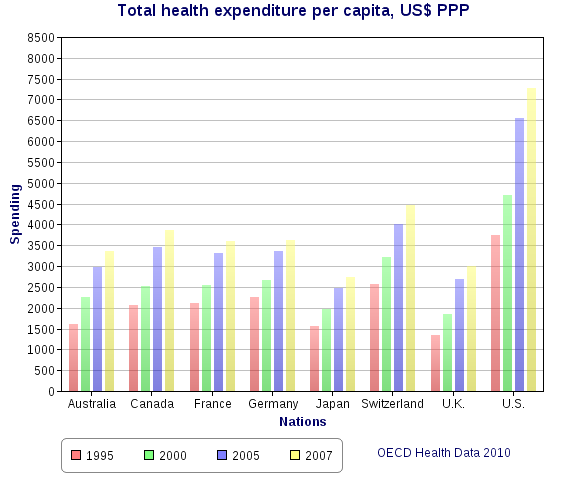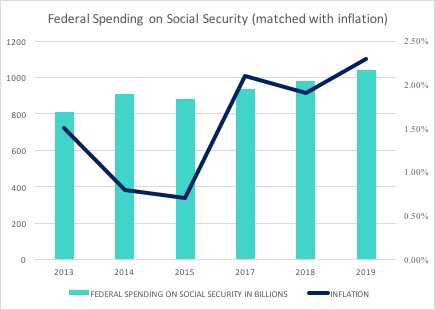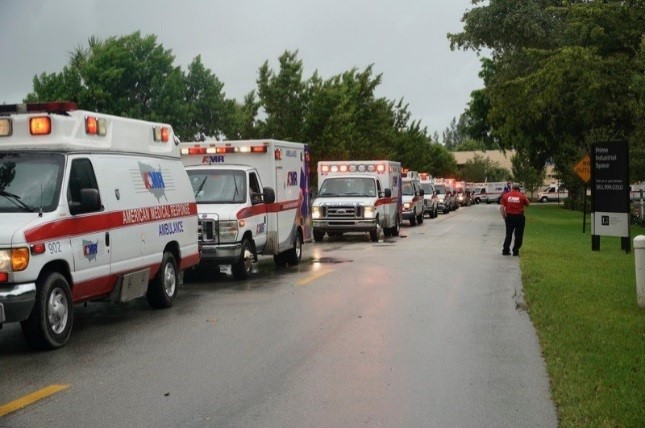|
Health Care In France
The French health care system is one of universal health care largely financed by government national health insurance. In its 2000 assessment of world health care systems, the World Health Organization found that France provided the "best overall health care" in the world. In 2017, France spent 11.3% of GDP on health care, or US$5,370 per capita, a figure higher than the average spent by rich countries (OECD average is 8.8%, 2017), though similar to Germany (10.6%) and Canada (10%), but much less than in the US (17.1%, 2018). Approximately 77% of health expenditures are covered by government funded agencies. Most general physicians are in private practice but draw their income from the public insurance funds. These funds, unlike their German counterparts, have never gained self-management responsibility. Instead, the government has taken responsibility for the financial and operational management of health insurance (by setting premium levels related to income and determining ... [...More Info...] [...Related Items...] OR: [Wikipedia] [Google] [Baidu] |
Universal Health Care
Universal health care (also called universal health coverage, universal coverage, or universal care) is a health care system in which all residents of a particular country or region are assured access to health care. It is generally organized around providing either all residents or only those who cannot afford on their own, with either health services or the means to acquire them, with the end goal of improving health outcomes. Universal healthcare does not imply coverage for all cases and for all people – only that all people have access to healthcare when and where needed without financial hardship. Some universal healthcare systems are government-funded, while others are based on a requirement that all citizens purchase private health insurance. Universal healthcare can be determined by three critical dimensions: who is covered, what services are covered, and how much of the cost is covered. It is described by the World Health Organization as a situation where citizens can ... [...More Info...] [...Related Items...] OR: [Wikipedia] [Google] [Baidu] |
Minister Of Health (France)
Minister for Solidarity and Health is a cabinet position in the Government of France. The health portfolio oversees the health care public services and the health insurance part of the French Social Security. As French ministerial departments are not fixed and depend on the Prime Minister's choice, the Minister sometimes also has one or some of other portfolios among Work, Pensions, Family, the Elderly, Handicapped people and Women's Rights. In that case, he is helped by one or some junior Minister focusing on one part of the portfolio. The current Minister is François Braun. Ministers of Health *Georges Leredu 16 January 1921 – 15 January 1922 *Paul Strauss 15 January 1922 – 29 March 1924 *Désiré Ferry 2 March 1930 – 13 December 1930 * Henri Queuille 13 December 1930 – 27 January 1931 * Camille Blaisot 27 January 1931 – 3 June 1932 *Justin Godart 3 June 1932 – 18 December 1932 *Charles Daniélou 18 December 1932 – 26 October 1933 * Émile Lisbonne 26 October 193 ... [...More Info...] [...Related Items...] OR: [Wikipedia] [Google] [Baidu] |
Smart Card
A smart card, chip card, or integrated circuit card (ICC or IC card) is a physical electronic authentication device, used to control access to a resource. It is typically a plastic credit card-sized card with an embedded integrated circuit (IC) chip. Many smart cards include a pattern of metal contacts to electrically connect to the internal chip. Others are contactless, and some are both. Smart cards can provide personal identification, authentication, data storage, and application processing. Applications include identification, financial, mobile phones (SIM), public transit, computer security, schools, and healthcare. Smart cards may provide strong security authentication for single sign-on (SSO) within organizations. Numerous nations have deployed smart cards throughout their populations. The universal integrated circuit card, or SIM card, is also a type of smart card. , 10.5billion smart card IC chips are manufactured annually, including 5.44billion SIM card IC chips. Hist ... [...More Info...] [...Related Items...] OR: [Wikipedia] [Google] [Baidu] |
The World Health Organization's Ranking Of Health Systems
The World Health Organization (WHO) ranked the health systems of its 191 member states in its World Health Report 2000. It provided a framework and measurement approach to examine and compare aspects of health systems around the world.World Health Organization'' World Health Report 2000.'' Geneva, 2000. It developed a series of performance indicators to assess the overall level and distribution of health in the populations, and the responsiveness and financing of health care Health care or healthcare is the improvement of health via the prevention, diagnosis, treatment, amelioration or cure of disease, illness, injury, and other physical and mental impairments in people. Health care is delivered by health profe ... services. It was the organization's first ever analysis of the world's health systems. Ranking Methodology The rankings are based on an index of five factors: * Health (50%) : disability-adjusted life expectancy ** ''Overall or average'' : 25% ** ''Distribu ... [...More Info...] [...Related Items...] OR: [Wikipedia] [Google] [Baidu] |
Total Health Expenditure As A Percentage Of GDP (2005-2008)
Total may refer to: Mathematics * Total, the summation In mathematics, summation is the addition of a sequence of any kind of numbers, called ''addends'' or ''summands''; the result is their ''sum'' or ''total''. Beside numbers, other types of values can be summed as well: functions, vectors, mat ... of a set of numbers * Total order, a partial order without incomparable pairs * Total relation, which may also mean ** connected relation (a binary relation in which any two elements are comparable). * Total function, a partial function that is also a total relation Business * TotalEnergies, a French petroleum company * Total (cereal), a food brand by General Mills * Total, a brand of strained yogurt made by Fage * Total, a database management system marketed by Cincom Systems * Total Linhas Aéreas - a brazilian airline * Total, a line of dental products by Colgate Music and culture * Total (group), an American R&B girl group * '' Total: From Joy Division to New Or ... [...More Info...] [...Related Items...] OR: [Wikipedia] [Google] [Baidu] |
Beveridge Report
The Beveridge Report, officially entitled ''Social Insurance and Allied Services'' ( Cmd. 6404), is a government report, published in November 1942, influential in the founding of the welfare state in the United Kingdom. It was drafted by the Liberal economist William Beveridge – with research and publicity by his wife, mathematician Janet Beveridge – who proposed widespread reforms to the system of social welfare to address what he identified as "five giants on the road of reconstruction": "Want… Disease, Ignorance, Squalor and Idleness". Published in the midst of World War II, the report promised rewards for everyone's sacrifices. Overwhelmingly popular with the public, it formed the basis for the post-war reforms known as the welfare state, which include the expansion of National Insurance and the creation of the National Health Service. Background In 1940, during the Second World War, the Labour Party entered into a coalition with the Conservative Party. On 10 June 1 ... [...More Info...] [...Related Items...] OR: [Wikipedia] [Google] [Baidu] |
Social Insurance
Social insurance is a form of social welfare that provides insurance against economic risks. The insurance may be provided publicly or through the subsidizing of private insurance. In contrast to other forms of social assistance, individuals' claims are partly dependent on their contributions, which can be considered insurance premiums to create a common fund out of which the individuals are then paid benefits in the future. Types of social insurance include: * Public health insurance * Social Security * Public Unemployment Insurance * Public auto insurance * Universal parental leave Features * The contributions of individuals is nominal and never goes beyond what they can afford * the benefits, eligibility requirements and other aspects of the program are defined by statute; * explicit provision is made to account for the income and expenses (often through a trust fund); * it is funded by taxes or premiums paid by (or on behalf of) participants (but additional sources of ... [...More Info...] [...Related Items...] OR: [Wikipedia] [Google] [Baidu] |
Emergency Medical Service
Emergency medical services (EMS), also known as ambulance services or paramedic services, are emergency services that provide urgent pre-hospital treatment and stabilisation for serious illness and injuries and transport to definitive care. They may also be known as a first aid squad, FAST squad, emergency squad, ambulance squad, ambulance corps, life squad or by other initialisms such as EMAS or EMARS. In most places, the EMS can be summoned by members of the public (as well as medical facilities, other emergency services, businesses and authorities) via an emergency telephone number which puts them in contact with a control facility, which will then dispatch a suitable resource for the situation. Ambulances are the primary vehicles for delivering EMS, though some also use squad cars, motorcycles, aircraft, or boats. EMS agencies may also operate a non-emergency patient transport service, and some have rescue squads to provide technical rescue services. As a first re ... [...More Info...] [...Related Items...] OR: [Wikipedia] [Google] [Baidu] |
Emergency Medical Services In France
Emergency medical services in France are provided by a mix of organizations under public health control. The central organizations that provide these services are known as a SAMU, which stands for (Urgent Medical Aid Service). Local SAMU organisations operate the control rooms that answer emergency calls and dispatch medical responders. They also operate the SMUR ( – Mobile Emergency and Resuscitation Service), which refers to the ambulances and response vehicles that provide advanced medical care. Other ambulances and response vehicles are provided by the fire services and private ambulance services. Organization SAMU organizations The term SAMU may refer to either the overall integrated emergency medical service of France, or to a local organisation that coordinates the service. A law in 1986 defined SAMU organizations as hospital-based services providing permanent telephone support, choosing and dispatching the proper response for a phone call request. The service is organi ... [...More Info...] [...Related Items...] OR: [Wikipedia] [Google] [Baidu] |
Emergency Medicine
Emergency medicine is the medical speciality concerned with the care of illnesses or injuries requiring immediate medical attention. Emergency physicians (often called “ER doctors” in the United States) continuously learn to care for unscheduled and undifferentiated patients of all ages. As first-line providers, in coordination with Emergency Medical Services, they are primarily responsible for initiating resuscitation and stabilization and performing the initial investigations and interventions necessary to diagnose and treat illnesses or injuries in the acute phase. Emergency physicians generally practise in hospital emergency departments, pre-hospital settings via emergency medical services, and intensive care units. Still, they may also work in primary care settings such as urgent care clinics. Sub-specializations of emergency medicine include; disaster medicine, medical toxicology, point-of-care ultrasonography, critical care medicine, emergency medical service ... [...More Info...] [...Related Items...] OR: [Wikipedia] [Google] [Baidu] |
Epidemy
An epidemic (from Greek ἐπί ''epi'' "upon or above" and δῆμος ''demos'' "people") is the rapid spread of disease to a large number of patients among a given population within an area in a short period of time. Epidemics of infectious diseases are generally caused by several factors including a significant change in the ecology of the areal population (e.g., increased stress maybe additional reason or increase in the density of a vector species), the introduction of an emerging pathogen to an areal population (by movement of pathogen or host) or an unexpected genetic change that is in the pathogen reservoir. Generally, epidemics concerns with the patterns of infectious disease spread. An epidemic may occur when host immunity to either an established pathogen or newly emerging novel pathogen is suddenly reduced below that found in the endemic equilibrium and the transmission threshold is exceeded. For example, in meningococcal infections, an attack rate in excess of 15 c ... [...More Info...] [...Related Items...] OR: [Wikipedia] [Google] [Baidu] |


.jpg)



